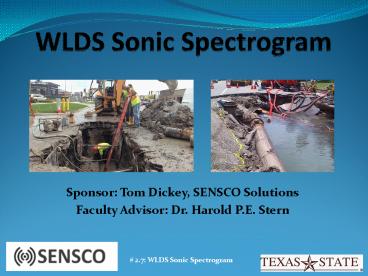WLDS Sonic Spectrogram
1 / 18
Title:
WLDS Sonic Spectrogram
Description:
Team Members. Anthony Goodson. Project Manager and system integration. Haleigh Walker. Coding and system integration. Ana Amaro. Coding and system integration –
Number of Views:125
Avg rating:3.0/5.0
Title: WLDS Sonic Spectrogram
1
WLDS Sonic Spectrogram
- Sponsor Tom Dickey, SENSCO Solutions
- Faculty Advisor Dr. Harold P.E. Stern
2.7 WLDS Sonic Spectrogram
2
Team Members
Alex Diaz Coding and system integration
Anthony Goodson Project Manager and system
integration
Haleigh Walker Coding and system integration
Ana Amaro Coding and system integration
3
Presentation Topics
- Motivation
- Overview
- SENSCO Solutions
- Budget
- Roles Responsibilities
- Constraints approached
- Design Decisions
- Design Approach
- Results
- Recommendations and Estimates
4
Motivation
- The problem
- Billions of cubic meters of water is lost every
day in outdated and unsupervised water
distribution networks around the world. - Existing Leak detection systems of water
municipalities are very costly due to the
response time to leaks. - Possible Solution
- The WLDS Sonic Spectrogram project hopes to help
greatly reduce the response times by creating a
visual, graphical representation of the
acoustical activity within the pipes it is
monitoring sending alerts to the user real time
at start of the leak.
2.7 WLDS Sonic Spectrogram
5
Overview of Project
- Goals of Project
- Stretch Goals of Project
- Capture sound data via WLDS transmit to Bridge
Unit. - Import data from bridge unit to Audacity,
creating audio file with time stamp. - Import data into ClearBlade.
- Export data to LabVIEW, displaying Spectrogram.
- When a leak is detected, ClearMessage alerts the
user of the leak.
2.7 WLDS Sonic Spectrogram
6
WLDS Project Block Diagram
7
Sponsored by SENSCO Solutions
- SENSCOs Water Leak Detection Sensors Sonic
Spectrogram project can be implemented into any
water distribution network, instantly providing
improved response times to leaks through - Instant leak detection
- Details of the leak and its location
- SENSCO developed and provided the Water Leak
Detection Sensors (WLDS) and the Bridge Unit.
Water Leak Detection Sensor
8
Roles Responsibilities
NAME ROLE
Anthony Goodson Jr, Project Manager Project Manager duties, Tested and verified the WLDS physical and transmission capabilities.
Ana Amaro Development of system integration between Audacity, ClearBlade, and LabVIEW.
Alex Diaz Development and testing of the user interface and python code
Haleigh Walker Development and testing of the LabVIEW interface and user interface
2.7 WLDS Sonic Spectrogram
9
Budget
- Through Texas State University and SENSCO
Solutions, the team has all the funding and
resources needed to deliver a desired product. - Texas State provided testing equipment and the
required software needed to complete our project.
- SENSCO Solutions developed and provided the team
with the Water leak detection sensor and the
Bridge Unit.
Bridge Unit
10
Constraints
- The most obvious is the lack of data from an
operational environment. - The team lacked the necessary qualifications and
training to test all aspects of the project to
industry standards. - However efforts were made to compensate and
provide data to the best of our abilities.
11
Design Decisions
- Audacity
- WAV files
- CSV files
12
Design Decisions
- clearMessage
- clearUsers
- clearData
13
Design Decisions
- LabVIEW
- Real-time analytics
14
Design Approach
- Each team member was responsible for the
integration of a specific system block - Anthony handled communications between the team,
sponsors, and mentor as well as test the WLDSs
physical and transmission capabilities. - Ana focused on integrating ClearBlade.
- Haleigh , LabVIEW lead, was responsible for the
spectrogram interface integration. - Alex concentrated on integrating the automation
of data collected to various system blocks.
15
Results from Testing Phase
BU
- WLDS ability to capture the acoustical activity
of a certain object it is attached to and
transmit that data without distortion - 50 feet within line-of-sight of the bridge unit
- up to 9 feet through soil and wood
9 feet
BU
4.5 feet
WLDS
WLDS
16
Results from Testing Phase
- Audacity is efficient in converting the raw audio
data into a form more suitable, WAV and CSV
files, for our real time analytics. - The python code effectively pushes the WAV and
CSV files into ClearBlades database. The
database is protected with a secure system that
requires the correct credentials to access. - The LabVIEW interface that the team designed can
effectively pull the WAV and CSV files from a
designated library for spectrogram generation.
17
Recommendations Estimates
- Bluetooth transmit through a dense medium
- Transmission intensity can be improved with
consideration of the environment and careful
placement - Or a wire antenna could be back fed to avoid
transmission through difficult mediums - ClearMessage
- The implementation of ClearMessage isnt priority
but serves to compliment the project. - Analytic server
- We have a baseline to upload into the server but
we are lacking all real world scenario simulated
leak audio data. - The new prototypes of the sensor will contain the
analytics server on it, eliminating the need for
an off hand server
18
Acknowledgments
- We would like to thank Dr. Compeau for placing us
on a great team and in a position to succeed. - We would like to thank Dr. Stern for his
technical guidance. - We would like to thank Eric Blair for all of his
help and guidance with the most frustrating parts
of this project - We would like to thank Tom Dickey and Glori
Ramirez for presenting this opportunity to the
team as well as all the support they have
constantly provided along the way.


























![⚡Read✔[PDF] THE MAKING OF SONIC THE. HEDGEHOG 3 MOVIE:](https://s3.amazonaws.com/images.powershow.com/10072883.th0.jpg?_=202407041010)




